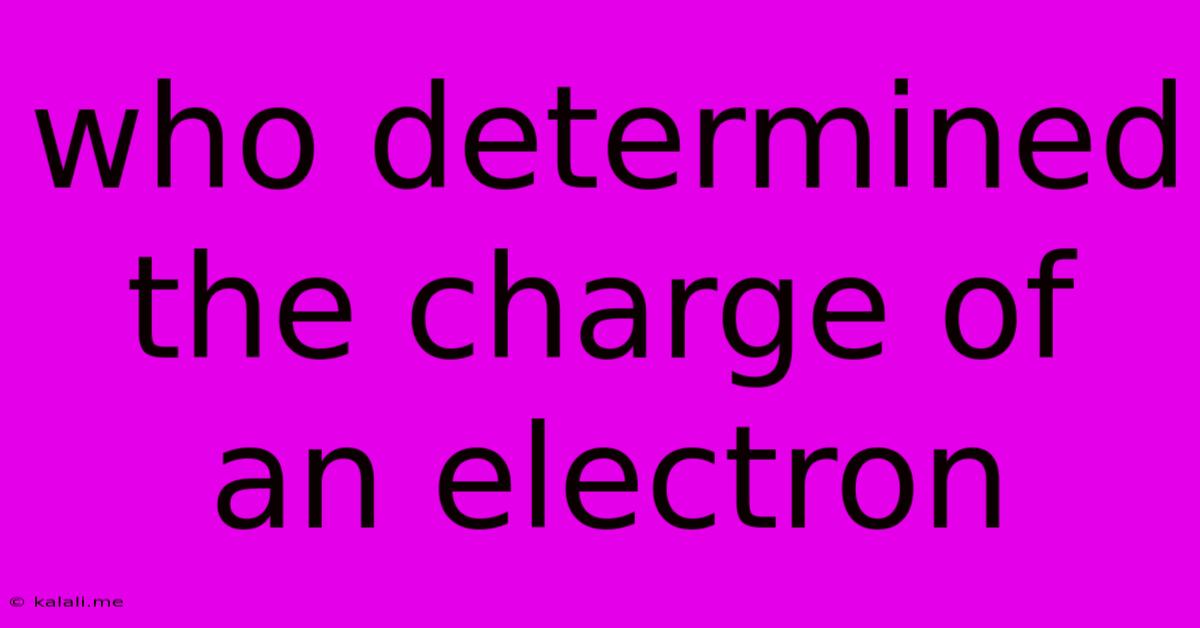Who Determined The Charge Of An Electron
Kalali
Jun 13, 2025 · 3 min read

Table of Contents
Who Determined the Charge of an Electron? A Journey Through Scientific Discovery
Determining the charge of an electron wasn't a singular event, but rather a culmination of brilliant minds and groundbreaking experiments spanning decades. While Robert Millikan is often credited with the definitive measurement, his work built upon the foundational research of numerous scientists. This article delves into the fascinating history of this scientific achievement, exploring the key players and their contributions to unraveling the mysteries of this fundamental particle.
The very existence of the electron was initially theorized in the late 19th century, with scientists like J.J. Thomson playing a pivotal role. Thomson's cathode ray experiments, conducted in the 1890s, demonstrated the existence of negatively charged particles much smaller than atoms, which he termed "corpuscles," later known as electrons. While he didn't precisely determine the charge, his work provided crucial evidence for their existence and laid the groundwork for future investigations.
Subsequent efforts to measure the electron's charge involved several significant steps:
-
Determining the charge-to-mass ratio (e/m): Before a precise charge could be determined, scientists needed to know the ratio of charge to mass. Thomson himself made significant strides in this area, using his cathode ray tube experiments. This ratio provided a crucial piece of the puzzle, narrowing down the possibilities.
-
Measuring the mass of the electron: Accurate measurement of the electron's mass was also crucial. Several experiments contributed to refining this value, further enhancing the potential for accurately calculating the charge.
-
The oil drop experiment: This is where Robert Millikan enters the scene. His famous oil drop experiment, conducted around 1909, provided the definitive measurement of the electron's charge. By observing the motion of electrically charged oil droplets under the influence of gravity and an electric field, Millikan was able to determine the elementary electric charge, revealing it as a fundamental constant of nature.
Millikan's experiment was revolutionary: His meticulous approach, coupled with his advanced experimental setup, allowed him to overcome many limitations of previous attempts. He cleverly balanced gravitational forces with electric forces acting on the oil droplets, enabling him to precisely measure their charge. The result, a remarkably accurate value for the elementary charge, solidified the understanding of the electron's fundamental nature and its role in atomic structure.
However, it's important to acknowledge the controversies: While Millikan received the Nobel Prize for his work, some historians of science have pointed out potential biases in his data selection process. This does not diminish the importance of his experiment, but it underscores the complexities of scientific discovery and the human element often involved.
In Conclusion:
The determination of the electron's charge was a collective effort, not solely the work of one individual. Thomson's pioneering experiments laid the foundation, while Millikan's oil drop experiment provided the most precise measurement at the time. The process highlights the iterative nature of scientific progress, with each contribution building upon previous knowledge and leading to a more complete understanding of the fundamental building blocks of matter. The legacy of these scientists continues to inspire generations of physicists and researchers alike.
Latest Posts
Latest Posts
-
What Does Area Under The Curve Represent
Jun 14, 2025
-
What Are All Of The Factors Of 8
Jun 14, 2025
-
Which Of The Following Is An Example Of A Conductor
Jun 14, 2025
-
During Which Phase Of Meiosis Crossing Over Occurs
Jun 14, 2025
-
What Is The Gram Formula Mass Of K2co3
Jun 14, 2025
Related Post
Thank you for visiting our website which covers about Who Determined The Charge Of An Electron . We hope the information provided has been useful to you. Feel free to contact us if you have any questions or need further assistance. See you next time and don't miss to bookmark.